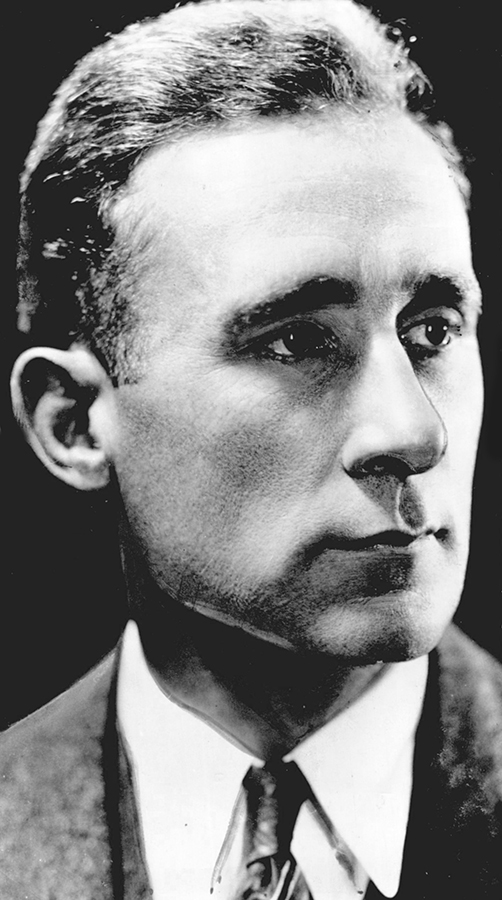JAMES, MARQUIS (1891–1955).
Journalist, biographer, and only son of Houstin [sic] James and Rachel Marquis, Marquis James was born August 29, 1891, in Springfield, Missouri. Before he was three, his parents moved to a "raw prairie claim" near Enid in the Cherokee Outlet, opened to white settlement six months before during the famous land run of 1893. He learned to read when about four and studied history from his mother's large collection of books. His earliest companions were hired hands and an old buffalo hunter who filled in his education. His father was a lawyer who traveled extensively throughout Indian Territory. When Marquis was ten, the family moved into Enid. At school James had difficulty with math and grammar but excelled at history. He learned the printing trade from tramp printers and at age fourteen was a full-fledged reporter for the Enid Events. Two years later he graduated from Enid High School. While there, he had founded the school's newspaper, The Quill.
In 1911 James left Enid as a tramp reporter; he worked on a series of about twenty newspapers in cities such as St. Louis, New Orleans, Philadelphia, and New York. He also washed dishes, slept in Salvation Army lodging houses, and wrote patent medicine advertising. In 1914 he met and married Bessie Williams Rowland, also a reporter. She became a collaborator on his future works. They had one daughter, Cynthia, born in 1924. In 1917 James joined the U.S. Army and served nineteen months in France during World War I. After being slightly wounded, he was discharged as a captain of infantry. After the war James became the director of publicity for the American Legion and wrote historical sketches aiming at high literary standards. He was also involved in launching the New Yorker magazine and covered the Scopes Monkey Trial in 1925 in Tennessee.
James was an active biographer. In 1929 he published The Raven: A Biography of Sam Houston, for which he received a Pulitzer Prize in 1930. In 1933 Andrew Jackson: The Border Captain, covering Jackson's life to 1820, appeared, followed by Andrew Jackson: Portrait of a President, in 1937. Together, the two volumes earned a Pulitzer in 1938. Working with his wife, he produced children's biographies from both of the books. Other works included A History of the American Legion (1923), They Had Their Hour (1934), Mr. Garner of Texas (1939), and James' autobiography, The Cherokee Strip, A Tale of an Oklahoma Boyhood (1945). In 1941 he began writing the history of businesses, completing Alfred I. DuPont: The Family Rebel (1941); Biography of a Business, 1792–1942: Insurance Company of North America (1942); The Texaco Story, The First Fifty Years: 1902–1952 (1953); The Metropolitan Life: A Study in Business Growth (1947); and Biography of a Bank: The Story of Bank of America (1954), with B. R. James. Divorced in 1952, James married Jacqueline Mary Parsons in 1954.
Throughout his work James attempted to elevate the dry, academic style of historical writing to a literary quality. Although he considered himself more biographer than historian, along with historians Alan Nevins, Carl Becker, and Charles Beard he was part of a movement to wed historical credibility with readability, or what has been called "popular history." Critics claim his biographies of Houston and Jackson are one-dimensional, emphasizing them as men of action and honor. James himself desired to write of men of thought like Jefferson and Franklin. In 1955 James died in Rye, New York, of a cerebral hemorrhage while he and his wife were writing a biography of Booker T. Washington. A manuscript finished in 1948, Merchant Adventurer: The Story of W. R. Grace, was published in 1993.
See Also
Learn More
Enid (Oklahoma) Daily Eagle, 10 March 1943. Enid Morning News, 16 September 1980.
Marquis James, The Cherokee Strip: A Tale of an Oklahoma Boyhood (Norman: University of Oklahoma Press, 1993).
Marquis James Papers, Manuscript Division, Library of Congress, Washington, D.C.
Stanley Kunitz and Howard Haycraft, eds., Twentieth Century Authors: A Biographical Dictionary of Modern Literature (New York: H. W. Wilson Co., 1942).
Citation
The following (as per The Chicago Manual of Style, 17th edition) is the preferred citation for articles:
Paul S. Vickery, “James, Marquis,” The Encyclopedia of Oklahoma History and Culture, https://www.okhistory.org/publications/enc/entry?entry=JA007.
Published January 15, 2010
© Oklahoma Historical Society


